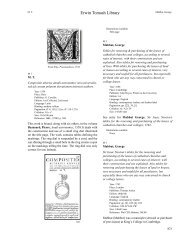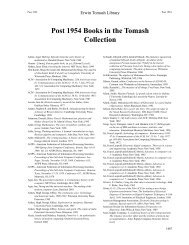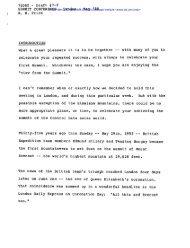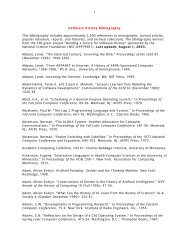B chapter.indd - Charles Babbage Institute - University of Minnesota
B chapter.indd - Charles Babbage Institute - University of Minnesota
B chapter.indd - Charles Babbage Institute - University of Minnesota
You also want an ePaper? Increase the reach of your titles
YUMPU automatically turns print PDFs into web optimized ePapers that Google loves.
Erwin Tomash Library<br />
Boole, George Boole, George<br />
Edition: 2nd<br />
Language: Italian<br />
Binding: original paper wrappers<br />
Pagination: pp. [4], 72<br />
Collation: * 2 A–I 4<br />
Size: 261x191 mm<br />
Reference: Smi Rara, p. 347; Rcdi BMI, Vol. I, p. 154<br />
This is a set <strong>of</strong> tables for converting units <strong>of</strong> measurement<br />
used in and around Milan. The first two pages provide a<br />
very short explanation, and the rest <strong>of</strong> the work is made<br />
up <strong>of</strong> the tables.<br />
Illustrations available:<br />
Title page<br />
Page <strong>of</strong> tables<br />
B 198<br />
Boole, George (1815–1864)<br />
An investigation <strong>of</strong> the laws <strong>of</strong> thought on which<br />
are founded the mathematical theories <strong>of</strong> logic and<br />
probabilities<br />
Year: 1854<br />
Place: London<br />
Publisher: Macmillan<br />
Edition: 1st<br />
Language: English<br />
Binding: modern leather; gilt spine; red leather label<br />
Pagination: pp. [12], 426, 6<br />
Collation: * 6 B–2E 8<br />
Size: 224x138 mm<br />
The son <strong>of</strong> a Lincolnshire cobbler who was also an<br />
amateur mathematician and lens grinder, George Boole<br />
was a promising student, but his family circumstances<br />
prevented him from obtaining more than an ordinary<br />
school education. After leaving school at age 15, he<br />
found work as an assistant teacher in the area and, with<br />
his father’s encouragement, set up his own school. In<br />
his spare time he mastered Latin, Greek and several<br />
European languages, as well as mathematics.<br />
He found ample opportunity to satisfy his wide-ranging<br />
intellectual curiosity when, in 1834, the Mechanics<br />
Institution was founded in Lincoln, and Boole was<br />
hired to be in charge <strong>of</strong> the reading room. His first<br />
mathematical paper appeared in 1840, when he was 25<br />
years old, and in 1844 his seminal paper, “On a general<br />
method <strong>of</strong> analysis,” appeared in the Philosophical<br />
Transactions <strong>of</strong> the Royal Society, which resulted in<br />
his receiving the first Royal Society Gold Medal for<br />
Mathematics. His most famous work, which established<br />
the principles <strong>of</strong> symbolic logic, is The mathematical<br />
analysis <strong>of</strong> logic, being an essay towards a calculus <strong>of</strong><br />
deductive reasoning, published in 1847.<br />
B 198<br />
In 1849, he was appointed to the pr<strong>of</strong>essorship <strong>of</strong><br />
mathematics at Queen’s College, Cork, despite his lack<br />
<strong>of</strong> formal qualifications. He made many contributions<br />
to mathematics, but his most significant work was the<br />
creation <strong>of</strong> mathematical logic. Several people, most<br />
notably Leibniz and DeMorgan, had attempted some<br />
type <strong>of</strong> algebraic treatment <strong>of</strong> logic prior to Boole, but<br />
none had managed to overcome the difficulties that<br />
arose when considering anything beyond the most trivial<br />
situations.<br />
Boole’s entry into this field was due to a simple argument<br />
between DeMorgan and the Scottish philosopher W.<br />
Hamilton. Hamilton had derided some <strong>of</strong> DeMorgan’s<br />
attempts to introduce the systems <strong>of</strong> algebra into logic,<br />
asserting that logic was the realm <strong>of</strong> the philosopher and<br />
that mathematics was dangerous and useless. Boole,<br />
using Hamilton’s own arguments, showed that logic was<br />
not part <strong>of</strong> philosophy. He then proceeded to examine<br />
whether logic, like geometry, might be founded on a<br />
group <strong>of</strong> axioms (see entry for Boole, The mathematical<br />
analysis <strong>of</strong> logic, 1847).<br />
In recent times, Boolean logic has found widespread use<br />
in the design <strong>of</strong> digital computers and communications<br />
systems.<br />
In the present book, Boole applied algebraic methods to<br />
logic and initiated a revolution in mathematics, to say<br />
nothing <strong>of</strong> philosophy and linguistics. While his earlier<br />
171







